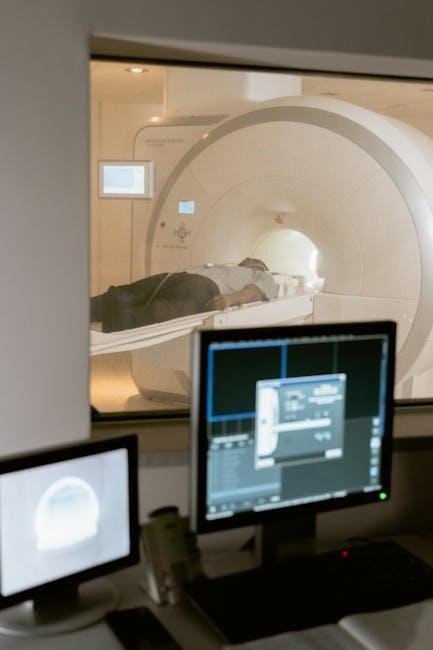The Denver Developmental Screening Test (DDST) is a widely used tool to identify developmental delays in young children‚ assessing gross motor‚ language‚ fine motor-adaptive‚ and personal-social skills.
Overview and Purpose of the DDST
The Denver Developmental Screening Test (DDST) is a widely used assessment tool designed to identify developmental delays in children from birth to six years. Developed in the 1960s by Dr. William K. Frankenburg and Dr. Robert M. Wood‚ it evaluates four key areas: gross motor‚ fine motor-adaptive‚ language‚ and personal-social skills. The test aims to provide early detection of potential developmental issues‚ enabling timely interventions. It is not diagnostic but serves as a screening tool to guide further assessments and support.
History and Development of the Test

The Denver Developmental Screening Test (DDST) was developed in the 1960s by Dr. William K. Frankenburg and Dr. Robert M. Wood to identify developmental delays in infants and preschool children. Standardized on 1‚036 children‚ it assesses gross motor‚ language‚ fine motor-adaptive‚ and personal-social skills. The test was designed as a simple screening tool for early detection of developmental issues‚ enabling timely interventions. Its creation marked a significant advancement in pediatric developmental assessment‚ leading to its widespread use in clinical and educational settings.

Key Features of the Denver Developmental Screening Test
The DDST evaluates four key developmental areas: gross motor‚ language‚ fine motor-adaptive‚ and personal-social skills‚ designed for children aged 0-6 years‚ emphasizing reliability and standardization.
Standardization and Reliability
The DDST was standardized on a sample of 1‚036 children‚ ensuring a reliable and consistent assessment of developmental milestones. Its structured approach minimizes variability‚ providing accurate results across diverse populations. Regular updates‚ like the Denver II‚ maintain its validity and adaptability to modern developmental understanding. This robust standardization ensures the test is a trusted tool for early identification of potential delays‚ aiding healthcare providers and educators in timely interventions.

Areas Assessed: Gross Motor‚ Language‚ Fine Motor-Adaptive‚ and Personal-Social Skills
The DDST evaluates four key developmental domains: gross motor‚ language‚ fine motor-adaptive‚ and personal-social skills. Gross motor assesses physical abilities like sitting‚ walking‚ and balance. Language measures verbal and nonverbal communication skills. Fine motor-adaptive focuses on hand-eye coordination and precision tasks‚ such as drawing. Personal-social skills evaluate interaction abilities and self-care. Each domain provides insights into a child’s developmental progress‚ helping identify potential delays early and accurately.
Age Range and Applicability
The Denver Developmental Screening Test is designed for children from birth to six years of age‚ making it a versatile tool for assessing developmental milestones in infants‚ toddlers‚ and preschoolers. It is widely applicable in pediatric offices‚ schools‚ and clinical settings‚ providing early detection of potential developmental delays. The test’s age-specific tasks ensure accurate assessment across different stages of childhood‚ making it a valuable resource for healthcare providers and educators focusing on early intervention and support.

How the Denver Developmental Screening Test Works
The Denver Developmental Screening Test works by observing a child’s abilities through age-specific tasks and parent/caregiver reports‚ assessing gross motor‚ language‚ fine motor-adaptive‚ and personal-social skills to identify potential delays and guide early interventions.
Administration and Scoring
The Denver Developmental Screening Test is administered by trained professionals‚ typically in clinical or educational settings. It involves observing a child’s performance of age-appropriate tasks and gathering information from parents or caregivers. The test is designed for children from birth to six years old and assesses four key domains: gross motor‚ language‚ fine motor-adaptive‚ and personal-social skills. Scoring is based on whether the child achieves specific milestones‚ with results interpreted to identify potential delays and guide interventions.
Interpreting Results and Identifying Developmental Delays
Interpreting DDST results involves comparing a child’s performance against established developmental milestones. The test categorizes outcomes as normal‚ questionable‚ or abnormal‚ indicating potential delays. Each item is linked to specific age ranges‚ ensuring accurate assessment. If a child fails multiple items or shows significant gaps‚ further evaluation is recommended. The results guide early interventions‚ emphasizing the importance of timely support for children at risk of developmental challenges.

Denver Developmental Screening Test II (Denver II)
The Denver II is an updated version of the DDST‚ designed to identify developmental delays in children aged 0-6 years‚ focusing on early detection and intervention.
Updates and Improvements in the Denver II
The Denver II introduces enhanced standardization‚ cultural sensitivity‚ and refined test items for better reliability. It includes updated developmental milestones and age-specific tasks‚ ensuring accurate screening across diverse populations. The test now incorporates improved scoring criteria and clearer guidelines for administration. Additionally‚ the Denver II addresses previous limitations by expanding the age range and refining items for early detection of delays. Its structured format simplifies assessment‚ making it a valuable tool for early intervention and monitoring developmental progress in children.
Comparison with the Original DDST
The Denver II offers several improvements over the original DDST‚ including updated standardization‚ enhanced cultural sensitivity‚ and refined test items. While the original DDST focused on four key areas—gross motor‚ language‚ fine motor-adaptive‚ and personal-social skills—the Denver II expands on these with more precise age-specific tasks. The new version also addresses previous limitations‚ such as broader age range coverage and improved scoring criteria‚ making it more effective for early detection and monitoring of developmental delays in children.

Accessing the Denver Developmental Screening Test in PDF Format
The Denver Developmental Screening Test materials‚ including manuals and scoring sheets‚ are available through authorized distributors‚ with select resources accessible in PDF format online for convenience.
Availability of DDST and Denver II Materials in PDF
The Denver Developmental Screening Test (DDST) and Denver II materials‚ including manuals and scoring charts‚ are available in PDF format through authorized distributors and select online platforms. While the complete‚ standardized test kits must be purchased‚ downloadable PDF resources provide convenient access for professionals. These materials are essential for assessing developmental milestones in children aged 0-6 years‚ offering detailed guidelines for administration and interpretation.
Authorized Distributors and Online Resources
Authorized distributors like Denver II‚ LLC‚ and select online platforms provide access to DDST and Denver II materials in PDF format. Professionals can purchase standardized test kits‚ including manuals and scoring charts‚ directly from these sources. Additionally‚ some websites offer downloadable PDF resources‚ such as developmental milestone charts and scoring guides‚ to support assessment practices. These materials are essential for accurately administering and interpreting the test results.

Related Tools and Assessments
The Gessell Assessment Tool and Stanford-Binet Test of Intelligence are complementary tools to the DDST‚ providing deeper insights into developmental progress and cognitive abilities in children.
Gessell Assessment Tool and Stanford-Binet Test of Intelligence
The Gessell Assessment Tool‚ developed in 1940 and revised in 1980‚ evaluates motor‚ adaptive‚ language‚ and social behaviors in children from birth to six years. The Stanford-Binet Test of Intelligence assesses cognitive abilities‚ providing complementary insights to the DDST. Both tools offer unique perspectives on developmental progress‚ with the Gessell focusing on milestones and the Stanford-Binet on intellectual functioning‚ making them valuable adjuncts to the Denver Screening Test for comprehensive assessments.
PDQ-II (Prescreening Developmental Questionnaire)
The PDQ-II is a prescreening tool designed to identify potential developmental delays in children aged 0-9 months. It complements the Denver Developmental Screening Test by providing an initial assessment of developmental milestones. Parents complete the questionnaire‚ which covers key areas such as motor skills‚ language‚ and social development. The PDQ-II is a quick and effective way to flag potential issues‚ ensuring early intervention and further evaluation if necessary. It is often used alongside the Denver II for comprehensive developmental screening.

Case Studies and Research Findings
A study of 298 preschool children compared the Denver Developmental Screening Test with the Stanford-Binet Test of Intelligence‚ examining field errors and socioeconomic factors in test administration.
Studies Comparing DDST with Other Developmental Assessments
The Denver Developmental Screening Test (DDST) has been compared to other assessments like the Stanford-Binet Test of Intelligence in studies involving 298 preschool children. These studies examined the alignment between DDST results and Stanford-Binet scores‚ focusing on developmental delays and cognitive abilities. Field errors and socioeconomic factors were also analyzed to assess the test’s effectiveness across diverse populations. Such comparisons highlight the DDST’s role in early identification of developmental challenges.
Field Errors and Socioeconomic Factors in Test Administration
Field errors in the Denver Developmental Screening Test (DDST) administration‚ such as incorrect scoring or procedural deviations‚ can impact test reliability. Socioeconomic factors‚ including a child’s background and environment‚ may also influence results. Studies have shown that these factors can lead to biased outcomes‚ potentially misidentifying developmental delays. Addressing these challenges is crucial for ensuring accurate assessments and equitable use of the DDST across diverse populations.
The Denver Developmental Screening Test (DDST) is a crucial tool for early detection of developmental delays‚ enabling timely interventions and support for young children.

Role of the DDST in Early Childhood Development
The Denver Developmental Screening Test (DDST) plays a pivotal role in early childhood development by identifying delays early‚ enabling timely interventions. It helps monitor milestones‚ ensuring children receive appropriate support. Widely used in educational and clinical settings‚ the DDST supports tailored strategies for developmental challenges‚ fostering healthy growth and readiness for school. Its insights are invaluable for parents and professionals‚ contributing to long-term positive outcomes for children.

